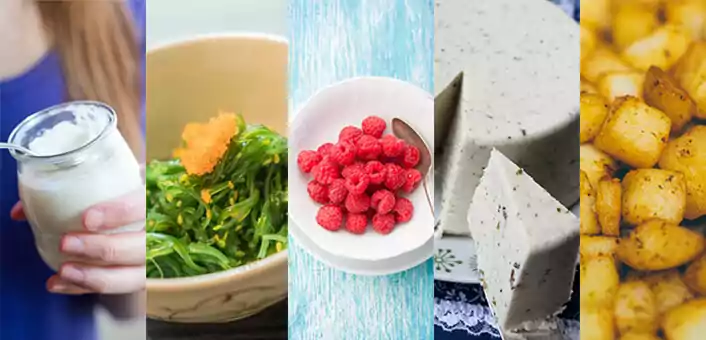PCOS test is based on the Rotterdam criteria for diagnosing PCOS.

Hypothyroidism
A deficiency of iodine can lead to serious conditions like hypothyroidism & goiter. It can even impair the functioning of your brain. Because the human body does not make its own iodine, all of the body’s iodine requirement must be met from a healthy diet.
A typical adult needs 150 micrograms (not milligrams) of iodine per day.
Let’s look at some common sources of iodine (apart from iodized salt).
While it’s a well-known probiotic, yogurt is a good source of iodine as well. One cup of low-fat plain yogurt contains approximately 75 micrograms of iodine, which is enough to meet nearly half of your daily needs.
Do you know that the vast oceans out there are home to some of the best iodine rich foods that can be found today? Kelp, Kombu and Wakame are iodine powerhouses. Kelp especially has the highest amount of iodine (approximately 2000/mcg of iodine in one tablespoon.) It should be remembered that like all foods, an excess of iodine is not good for your health. A good way to have these sea veggies would be to sprinkle these over soups, pastas and salads.
Foods like cranberries and strawberries, which are great antioxidants, are rich in iodine too. One serving of berries a day is usually enough to take care of 10 to15% of your body’s daily iodine needs.
Cheese is not only high in iodine content but tastes great as well. It is also rich in calcium and B vitamins. However, people on a completely vegan and dairy free lifestyle will have to find other plant-based alternatives for their iodine needs.
Potato is a great quick fix solution for anyone who wants to increase their iodine levels naturally and quickly. It is one of the richest sources of iodine among the vegetables that are commonly consumed. A single medium potato can contain approximately 60/mcg of iodine. Consider having it with the peel on and choose an organic variety preferably.
https://www.thyroid.org/iodine-deficiency/